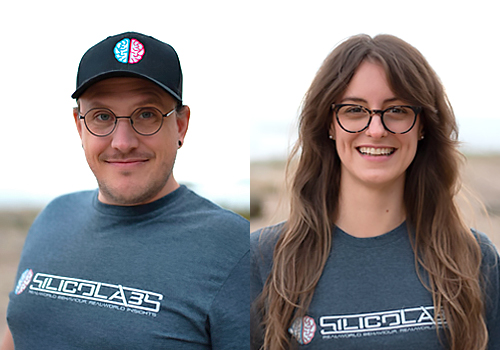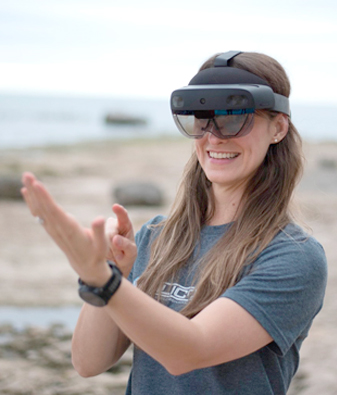“When I started my PhD program, I was not expecting to co-found a software startup,” says Benjamin Alsbury-Nealy. “I was interested in doing research to better understand how people learn and remember things throughout their real-life experiences.”
Alsbury-Nealy is a PhD candidate in the Faculty of Arts & Science’s Department of Psychology and along with Kyla Alsbury-Nealy, a PhD candidate in U of T's Rehabilitation Sciences Institute, and Emile McLean, vice-president of innovation at PMG Intelligence, the startup they founded is called SilicoLabs.
The mainstay of SilicoLabs is Experimenter, 3D-design software that allows researchers to create virtual environments used to conduct experiments which in the past would have been carried out in the real world.
“To do the research I was interested in, I needed to create tasks within everyday 3D environments,” he says. “I thought there would already be lots of great software out there, but quickly found this wasn’t the case.”

And so, Benjamin Alsbury-Nealy set out to create his own software — and after months of coding and development, Experimenter and SilicoLabs were launched.
Before the advent of such digital tools, a typical psychology experiment might require a subject to navigate the hallways and rooms of a real building, and at various points make an observation. Researchers would then test the subject’s memory of those observations. Or, they might test a subject’s memory of the layout of the space by closing and locking doors, forcing them to find an alternate route to their destination.
There are many disadvantages to this “bricks-and-mortar” approach. The results can be influenced easily by something as simple as a change in the building’s lighting, the number of non-participants in the environment, a change in the furniture or decor, or by inconsistencies in how different in-person facilitators communicate with subjects.
As psychology researchers, we want to have control over any variables that may impact our data.
However, such drawbacks can be minimized by conducting the same experiment in a digital, 3D version of the environment running on desktop or virtual reality platforms. This approach ensures the environment will be exactly the same every time the experiment is run — right down to the light entering windows and the instructions participants receive.
“As psychology researchers,” says Benjamin Alsbury-Nealy, “we want to have control over any variables that may impact our data.”

What’s more, subjects can interact with Experimenter-designed environments using virtual reality (VR) headsets which can provide researchers with even more data by tracking a subject’s eye movements and the motion of their head.
Experimenter has been well received in the research community and is being used at U of T as well as the Baycrest Centre for Geriatric Care, McGill University, the University of Cambridge and other research institutions.
“The ability to create 3D environment experiments quickly and easily, and place online for testing, is a boon for psychological research, and likely the wave of the future,” says Morris Moscovitch, professor emeritus in the Department of Psychology.
Plus, the impact of this technology extends far beyond the psychology lab.
According to Benjamin Alsbury-Nealy, there may also be applications in medical diagnosis. “Recent research is demonstrating that spatial navigation can predict mild cognitive impairment and Alzheimer's disease with more accuracy and earlier than other tests,” he says. “This is because the area of the brain that's deteriorating is the same area of the brain that's responsible for creating spatial maps and navigating spatial environments.”
“The ability for researchers to quickly and easily create assessments and interventions with Experimenter will help reduce the time it takes to put evidence into practice,” says Kyla Alsbury-Nealy, who is also a physical therapist with 8 years of clinical experience.
The problem is — how do we ensure that AI is aligned with human values and capabilities? To tackle this, we’re creating a platform that allows humans and AI to be directly compared on the same tasks — and this allows humans to assess AI behavior and performance.
“It can take an estimated 17 years to translate health research into clinical practice, which represents a huge opportunity in rehabilitation sciences to improve the function and quality of life for many patients.”
In the training sector, SilicoLabs is working with the Centre international de formation des acteurs locaux (CIFAL) to develop a virtual, emergency-response training program for British Columbia Airlift Emergency Response Operations (BC AERO). Experimenter will be used to create virtual simulations which will be used to train flood and fire responders. Plus, they are working with Advanced Disaster, Emergency and Rapid Response Simulation (ADERSIM) at York University to develop an ICU training program for Toronto General Hospital.
Recently, SilicoLabs entered into a partnership with Mila, the Quebec Artificial Intelligence Institute, and became members of the Rotman School of Management’s Creative Destruction Lab. Both opportunities are centered around SilicoLab’s goal of tackling one of the biggest problems faced by artificial intelligence (AI) research, the so-called alignment problem.
“The problem is — how do we ensure that AI is aligned with human values and capabilities?” says Benjamin Alsbury-Nealy. “To tackle this, we’re creating a platform that allows humans and AI to be directly compared on the same tasks — and this allows humans to assess AI behavior and performance.”
Recently, SilicoLabs was accepted into the University of Toronto Early-Stage Technology (UTEST) accelerator program which provides support for emerging research-based companies; and into the MaRS Venture Services program.
“Co-founding a startup is a different path from what I expected when I started my PhD,” says Benjamin Alsbury-Nealy. “But it’s been a very interesting journey — a struggle at times but also very rewarding.”

